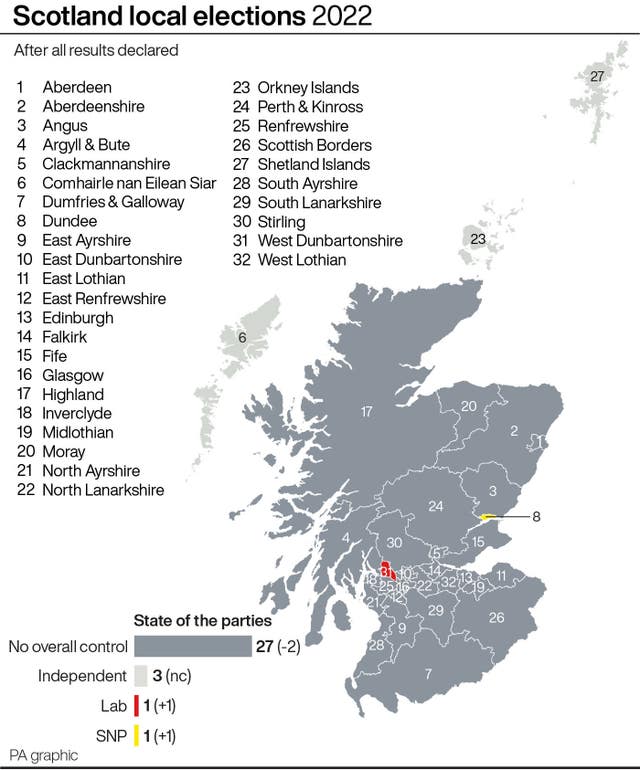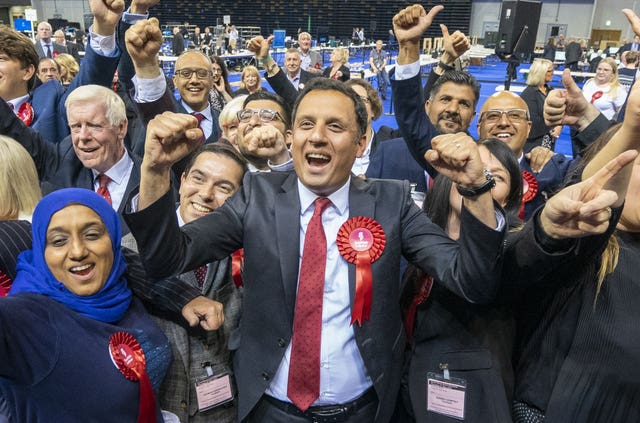
The SNP is “Scotland’s dominant political force”, Nicola Sturgeon insisted, as her party once emerged as the winners of local government elections north of the border.
The First Minister and SNP leader said, when the results from all 32 councils in Scotland were counted, her party had secured a “resounding victory”.
Her comments came after the SNP returned the highest number of councillors in Thursday’s election, with its tally increased by 22 to 453, while Scottish Labour was able to capitalise on the collapse of the Tories in Scotland.
Anas Sarwar saw his party increase its number of representatives by 20 to 282, with the Tories dropping to third place.
Douglas Ross’ party, however did badly after an election campaign dominated by national issues, including the cost-of-living crisis and the partygate saga at Westminster.
When the votes were counted, the Tories were down by 63 on the last local government elections five years ago, the Tories suffered at the polls, with 214 councillors elected this time round.
The Scottish Greens and Lib Dems also benefited from the Tory downturn, increasing their councillor numbers by 16 and 20 respectively.
The Greens now hold the balance of power in both Edinburgh and Glasgow, while the Lib Dems doubled their tally in the capital to 12 and are looking to enter into coalitions across the country.
The Alba Party failed to return any councillors despite running more than 100 candidates, many of whom were already elected representatives who defected to the party after it launched last year.
Voters in two authorities also elected majorities, with the SNP controlling Dundee and Labour taking West Dunbartonshire.

Ms Sturgeon hailed the victory for her party as “astonishing”.
“The results are absolutely incredible for the SNP,” she told journalists at the election count in Glasgow.
“The SNP has been in government for 15 years and today we won the election overwhelmingly, I think the eighth consecutive election victory since I became leader of the SNP, but more than that, we’ve increased our share of the vote, we’ve increased the number of councillors that we have returned, we’re the largest party in more councils today than we were yesterday.
“This is an astonishing result for the SNP and an absolutely brutal rejection of Boris Johnson and the Conservatives.”

The SNP is now the biggest party in a “remarkable 21 councils across the country”, she said, with the party now looking to see if deals can be done to form ruling administrations with “other parties who share our progressive principles”
She also insisted that the results showed that “yet again confirmed that Scotland utterly rejects the corruption, sleaze and law-breaking of the Tories”.
Referring to the battle between Labour and the Tories, the SNP leader claimed Mr Sarwar and Mr Ross had been “reduced to slugging it out for second place like two bald men fighting over a comb”.
Mr Ross accepted the results had been “very disappointing” for the Conservatives, adding that Boris Johnson “can’t ignore the message” from voters sent in the election.
“The Prime Minister simply can’t ignore the message that’s been sent from voters not just here in Scotland, but across the UK,” he told the BBC.
“The Conservatives lost Westminster Council last night, that’s a council that even in the peak Labour years under Tony Blair the party held on to, so there’s been a very strong message from the public to the Prime Minister and to the party.”
Mr Sarwar meanwhile said Scottish Labour had made “good progress”.
However he insisted: “I don’t aspire for second place.
“We have made great progress, but there is still work to do.”
Scottish Lib Dem leader Alex-Cole Hamilton said he believed his party’s boost at the election showed they were on the way to a “revival” across Scotland.
Scottish Greens co-leader Lorna Slater told the PA news agency in Edinburgh the result was historic for her party.
“This is an absolute record result for the Greens and it really shows that people care about the climate, they care about their communities,” she said.
She added: “We focused on local issues and I think that is paying off.”


Why are you making commenting on The National only available to subscribers?
We know there are thousands of National readers who want to debate, argue and go back and forth in the comments section of our stories. We’ve got the most informed readers in Scotland, asking each other the big questions about the future of our country.
Unfortunately, though, these important debates are being spoiled by a vocal minority of trolls who aren’t really interested in the issues, try to derail the conversations, register under fake names, and post vile abuse.
So that’s why we’ve decided to make the ability to comment only available to our paying subscribers. That way, all the trolls who post abuse on our website will have to pay if they want to join the debate – and risk a permanent ban from the account that they subscribe with.
The conversation will go back to what it should be about – people who care passionately about the issues, but disagree constructively on what we should do about them. Let’s get that debate started!
Callum Baird, Editor of The National
Comments: Our rules
We want our comments to be a lively and valuable part of our community - a place where readers can debate and engage with the most important local issues. The ability to comment on our stories is a privilege, not a right, however, and that privilege may be withdrawn if it is abused or misused.
Please report any comments that break our rules.
Read the rules here